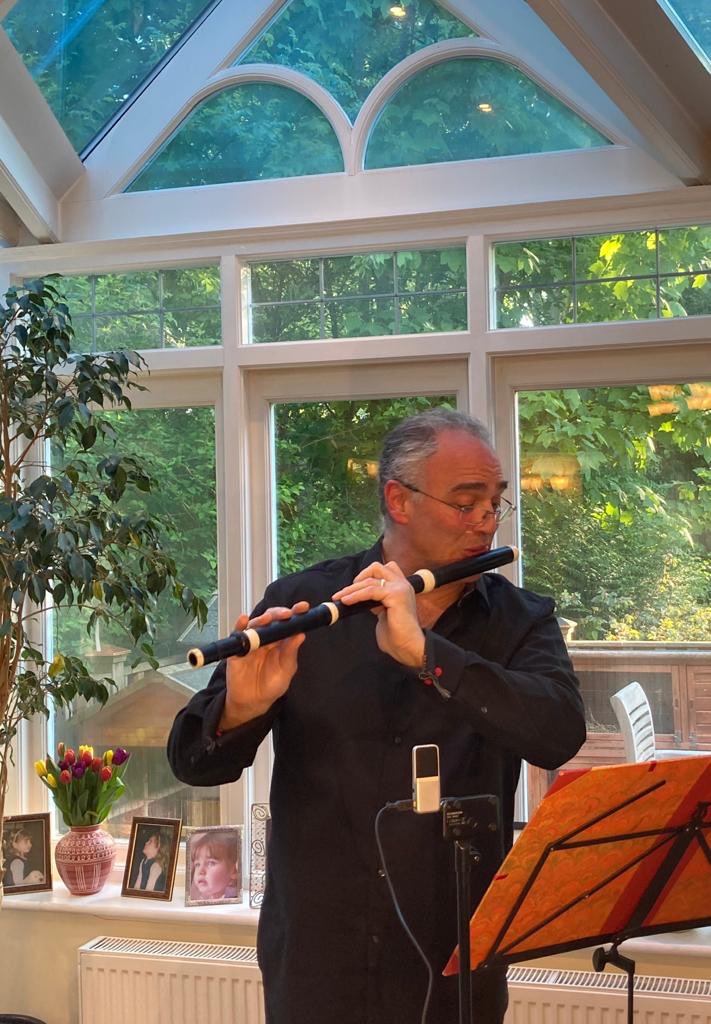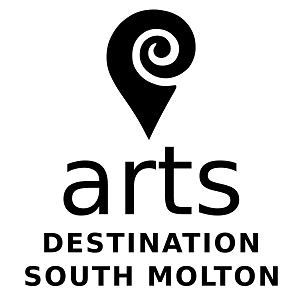“Les Nations” – a Zoom concert by flautist Ashley Solomon
On the evening of 15th June, 2020 members of ADSM, our North Devon charity – and others across the country and the world – were privileged to follow Baroque flautist Ashley Solomon on a joyous journey across five nations (Germany, France, Spain, Holland and Scotland) from the beautiful conservatory in his London home.

Ashley told us that most of the pieces in tonight’s concert was new to him, learned especially for the occasion. He went on to say that he has been delightfully surprised by the amount of repertoire for solo flute that is new to him, uncovered during lockdown. Five composers were featured, Johann Quantz from Germany, Joseph Bodin de Boismortier from France, Marin Marais, also from France but with a Spanish inspired composition, Jakob van Eyck from Holland and James Oswald from Scotland.
What revelations lay in store for his audience. The warm tones of the first flute he played – as with others Ashley owns, it is made of wood – brought Quantz’s sophisticated dances to life, taking the flute through its not inconsiderable paces as he navigated Quantz’s fast and swooping arpeggios with grace and ease.
For the second piece by French composer Joseph Bodin de Boismortier, Ashley changed to a French instrument made of ebony and ivory in 1970, a copy of a 1680 flute, and perfect for French music of the Baroque period. He warned us that it was a bit like a classic car, and not always easy to get started, but there were no signs of reluctance here! The tone was dark, rich, and exceptionally clear – especially beautiful in the trill sections. The third movement of the Deuxième Suite in G major, the Musette en Rondeau, was round by name as well as by nature – the way the notes cascaded around the registers in speedy semitones was hypnotic.
According to Ashley’s programme notes, La Folia by Marin Marais evokes the regal stage presence of a Spanish dancer. He wasn’t wrong: this incredible set of 16 variations, transcribed by Ashley from the 32 Marais wrote, was fiery and deeply redolent of Spain, at times reminding us of the firm strumming of a flamenco guitar. The virtuosity Ashley displayed was outstanding – he played Marais’s fast, chromatic coloratura with a frenzied appeal that was dextrous, light and articulated with a crystal clarity.
The next piece by Rembrandt contemporary, Dutch nobleman Jakob van Eyck (who was blind, an internationally renowned campanologist and a recorder virtuoso) was played on a modern 2-piece recorder, a copy of the Ganassi instruments van Eyck would have played. The chat room on Zoom reflected amazement at the rich tones of the instrument as Ashley played, which, as he later explained, is largely due to the flared bore design which amplifies and broadens the dynamic range of the sound, and allows him to be very clear with his articulation. Most of us had never heard the recorder sound so alluring, in a piece that we were informed is loved and feared in equal measures by professional recorder player because of its eventual speed and the way it drifts between keys in unexpected ways.
The two pieces Ashley chose to end his recital with were by James Oswald, a Scottish composer born in 1710. How quickly and decisively we were transported from Holland to Scotland: it is always a source of wonder to me that the way the notes are arranged can so quickly identify the country where the music was made. Ashley reverted to his first flute of the evening for these lovely airs, based on traditional Scottish tunes.
Ashley returned with an encore, the world premiere of Masquerade, specially written for him by the young polymath – artist, filmmaker, composer, conductor, poet – Noah Max. This virtuosic piece is neo-Baroque in flavour and it took advantage of the strong and weak notes inherent in a Baroque flute to create a satisfying whole, with a ‘cheeky’ and unexpected ending. Ashley explained that he chose the Baroque flute over the modern version precisely because of these quirks of tone strength. He told us that the key system of the modern flute evens out the tone so that every note has the same strength – great for large concert halls, but without the character and warmth of the Baroque version.
Many thanks, Ashley, for such a wonderful evening – of course, not quite the same as being in the same room as you, but almost as pleasurable! A big thank you too for sharing the proceeds from this concert with Arts Destination South Molton. The funds will go towards making our first ever Deep Roots Festival next summer a resounding success.
Karen Malim, Arts Destination South Molton

